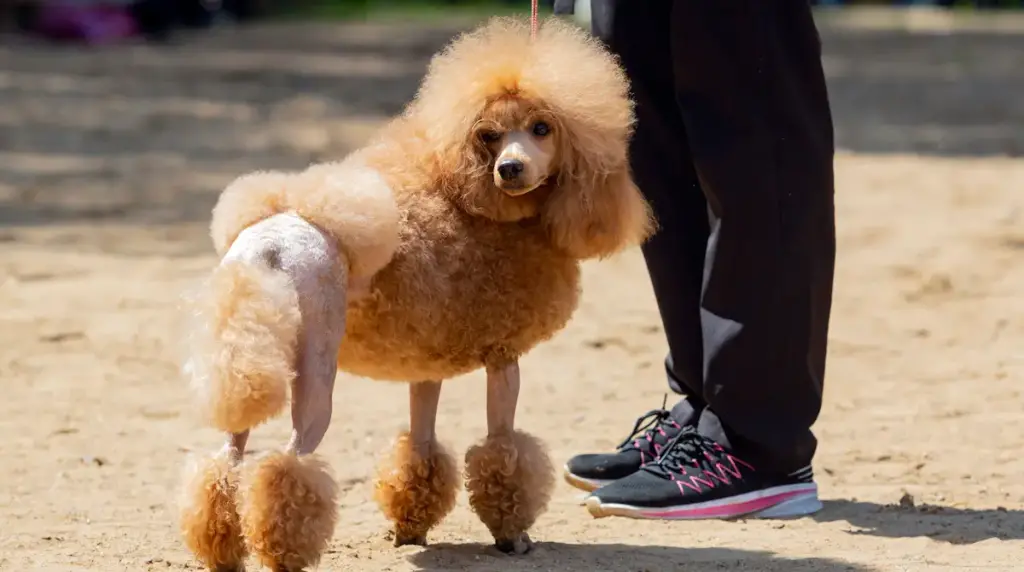As you watch a poodle effortlessly navigate an agility course, it becomes clear why they’re often compared to a Swiss Army knife; compact, multifaceted, and surprisingly powerful. You’re looking at a breed at home in the show ring as it is fetching a ball in the park.
With their high intelligence and eagerness to please, poodles have secured a reputation for being among the most trainable of canine companions. They come in various sizes and colors, each with the same keen mind and active spirit.
You might consider a poodle the fitting addition to your family. Still, before you make that decision, there’s much more to uncover about their temperament, care needs, and how they fit into different lifestyles. Will their intelligence be a delight or a challenge? Can their versatility adapt to your circumstances?
Let’s explore what makes the poodle much more than a pretty face with an elegant haircut.
- Noise Level
- Energy
- Sociability
- Trainability
- Care
- Health
Overall
Summary
Poodles are known for their moderate noise levels, high energy, excellent sociability, and outstanding trainability. They require a moderate level of care and generally enjoy good health.
Poodle: Traits, Temperament, and Care Guide
With their origins rooted in Germany, Poodles presents a trifecta of sizes—Standard, Miniature, and Toy—each characterized by a dense, curly coat and a lifespan averaging 12-15 years.
Renowned for their high intelligence and affectionate temperament, Poodles require an environment that stimulates their physical and mental faculties to prevent destructive behavior.
Adherence to a care guide that includes regular brushing and professional grooming every 4-6 weeks is imperative, given their single-layer coat and predisposition to ailments such as hip dysplasia, Addison’s disease, and Sebaceous Adenitis.
It’s essential to affiliate with rescue organizations or ethical breeders when adopting a Poodle, ensuring a background reflective of the breed’s versatile and adaptable nature, which thrives in diverse living conditions and excels in canine sports.
Exploring the Characteristics of the Poodle
Let’s now examine the distinct characteristics of Poodles, focusing on their physical attributes and behavioral tendencies that cater to a range of lifestyles and activities. You’ll find that the Poodle’s single-layer, curly coat comes in a spectrum of colors and requires consistent grooming to maintain its condition. Healthwise, they may be predisposed to conditions like hip dysplasia and ocular disorders, necessitating vigilant care.
Notice their breeds intelligence, which makes them highly trainable for obedience and agility, adapting seamlessly to various living conditions. The three varieties—Standard, Miniature, and Toy—each bring unique qualities to the table, as shown below:
| Variety | Height | Weight |
|---|---|---|
| Standard | Over 15 inches | 40-70 pounds |
| Miniature | 10-15 inches | 10-15 pounds |
| Toy | Up to 10 inches | 4-6 pounds |
The Poodle’s versatility and hypoallergenic coat make them an inclusive choice for families seeking a companion that fits their dynamic.
Poodle: A Comprehensive Profile and Guide
When considering a Poodle as a potential pet, it’s imperative to understand its origins, sizes, and lifespan for informed decision-making.
You’ll find that their high trainability and exercise needs align with an active lifestyle, while their grooming requirements call for consistent maintenance.
Be aware of their health predispositions and the importance of ethical adoption or purchasing practices to ensure a responsible approach to Poodle ownership.
Everything You Need to Know
Poodles, originating from Germany and available in Standard, Miniature, and Toy sizes, boast a lifespan of 10-18 years and require a comprehensive understanding of their care needs for optimal health and well-being.
As a member of the Poodle family, you’ll want to ensure your Standard Poodle receives:
- Regular mental stimulation through training and play to maintain their sharp intellect.
- Consistent grooming every 4-6 weeks to prevent matting and maintain coat health.
- Monitoring for common health issues, including hip dysplasia and eye conditions, with regular veterinary check-ups.
Joining the Poodle community means embracing a commitment to responsible care, fostering a deep bond with your intelligent companion, and contributing to the collective well-being of this distinguished breed.
Discovering the Temperament
Understanding the temperament of poodles reveals that these highly intelligent canines possess an innate adaptability and affection that endears them to their human companions.
As an intelligent breed, poodles display remarkable versatility, thriving in diverse living situations while forming strong social bonds. Their temperament, characterized by keen alertness and a gentle disposition, facilitates their ability to integrate into various family dynamics, cementing their status as beloved members.
Commitment to daily exercise, including activities like fetch and swimming, satisfies their physical and mental stimulation needs, fostering a balanced demeanor. Furthermore, their low-shedding coats are a boon for allergy sufferers, though regular grooming is imperative.
Essentially, a poodle’s temperament is a composite of intelligence, adaptability, and affection—traits that make them exceptional companions.

Poodle: Is It a Good Fit for Families?
When considering a Poodle as a family pet, you must evaluate its behavioral traits and how they align with your family’s lifestyle. The breed’s high trainability and active nature demand consistent engagement and exercise, which fits well with dynamic family routines.
Additionally, their hypoallergenic coat is advantageous for household members with allergies, making Poodles a practical choice for diverse family environments.
Assessing Poodle’s Compatibility with Families and Kids
Considering the Poodle’s high intelligence and emotional sensitivity, it’s essential to evaluate whether this breed aligns with the dynamics of family life, particularly when young children are involved. Poodles are considered among the most intelligent breeds, which translates to a high capacity for training and companionship. However, their emotional nature requires a calm environment to remain healthy and happy.
Here are key factors to consider:
- Acceptance of Children: Poodles are generally gentle with children but may need time to adjust to the boisterous energy of young family members.
- Household Dynamics: Their sensitivity makes them best suited for peaceful homes where stability is valued.
- Activity Requirements: Matching the Poodle’s activity level is crucial; ensure regular mental and physical stimulation to maintain their well-being as family dogs.
Poodle Adaptability Insights
Renowned for their exceptional adaptability, Poodles seamlessly integrate into diverse living environments, from compact apartments to expansive homes. Their capacity to acclimate to different living situations is facilitated by their intelligence and high trainability, which enable them to thrive in a variety of domestic settings. These dogs come in different sizes, each suitable for specific space constraints.
Poodles’ coats, characterized by minimal shedding, are particularly suitable for allergy sufferers, permitting these canines to cohabit with individuals sensitive to pet dander. Moreover, their adaptability is evident in their athletic prowess; they eagerly participate in energetic activities, aligning with the exercise routines of active owners.
Additionally, Poodles exhibit a gentle disposition, comfortably fitting into households with other pets and children, thus enhancing their inclusivity and family appeal.
Poodle Obedience Techniques

You’ll find that employing positive reinforcement with your Poodle enhances trainability due to their inherent intelligence.
Integrating mental stimulation into their routine is crucial, utilizing obedience and agility tasks to mitigate boredom and avert destructive tendencies.
Consistency in your training approach is imperative, ensuring that your Poodle remains a well-behaved and devoted family member.
Effective Training Strategies
Harnessing the Poodle’s keen intellect and desire for approval, positive reinforcement emerges as a cornerstone of effective obedience training for this breed. You’ll find they’re highly responsive when you consistently reward them for their successes, be it with treats, praise, or play. Integrate mental exercises within your training protocols to maintain their interest and prevent the onset of harmful behaviors associated with boredom.
| Strategy | Objective | Consideration |
|---|---|---|
| Positive Reinforcement | Leverage Poodle’s eagerness to please | Avoid negative punishment |
| Mental Stimulation | Sustain engagement, deter boredom | Tailor to individual’s aptitude |
| Consistency & Patience | Foster reliable command adherence | Adjust pace to Poodle’s receptivity |
Exercise and Grooming Needs
Poodles require consistent daily exercise and meticulous grooming to maintain their physical and mental well-being. With a moderate to high need for physical activity, your Poodle thrives when provided with adequate mental stimulation to prevent any emergence of destructive behaviors.
Daily brushing is a non-negotiable aspect of ownership to keep the Poodles coat free of mats and tangles, owing to its low-shedding yet dense nature.
Regular professional grooming sessions, scheduled every four to six weeks, are imperative in preserving the integrity of the coat and overall hygiene. Neglecting these needs can lead to complications that are preventable with proper care.
As an owner, committing to these routines is essential to ensure your Poodle remains healthy and content.
Health Considerations
Considering a Poodle’s health, it’s crucial to recognize their susceptibility to hip dysplasia, Addison’s disease, and various ocular conditions.
Sebaceous adenitis presents a significant risk, particularly in Standard Poodles, which have a high genetic carrier rate.
Proactive health screenings and regular veterinary care directly impact lifespan and disease incidence.
Common Health Issues and Lifespan
While typically enjoying a lifespan of 11 to 13 years, poodles may confront health challenges such as hip dysplasia, Addison’s disease, and various eye conditions. As a hypoallergenic dog, the poodle’s coat requires meticulous grooming to prevent matting and skin issues. Sebaceous Adenitis (SA) is particularly insidious in this breed, with a significant predisposition noted in Standard Poodles. Approximately 50% of Standards are carriers or affected by this autoimmune skin disorder, necessitating vigilant monitoring.
Your poodle’s health regimen should include regular veterinary check-ups to screen for and manage conditions like epilepsy, eye disorders, and immune-mediated diseases. Responsible breeding practices are paramount to mitigate the risk of hereditary ailments and ensure your companion retains optimal health throughout its considerable lifespan.

Is Poodle the Right Dog for You?
Considering the need for consistent mental and physical engagement, are you prepared to meet the demands of a highly intelligent and active dog like the Poodle? Accommodating a Poodle means integrating daily walks and a substantial amount of exercise into your routine.
This breed thrives when mentally stimulated through interactive play and training, which is essential for its cognitive development. As potential owners, you must consider the grooming and healthcare obligations accompanying this breed, ensuring a proactive approach to their well-being.
Poodles’ adaptability and eagerness to please make them excellent companions for active families, yet sourcing from rescue organizations or reputable breeders is crucial. Commit to this breed only if you can provide a structured, nurturing environment conducive to their physical and psychological needs.
Conclusion
In conclusion, with their keen intellect and dynamic vigor, Poodles thrive under attentive care. They necessitate methodical grooming and ample exercise; neglecting these needs can precipitate health issues.
While they fit well with families, their obedience hinges on consistent training. Weighing their traits against your lifestyle is crucial before you welcome a Poodle.
Remember, a Poodle’s life span harkens back to a quill and parchment era in dog years, promising lasting companionship.